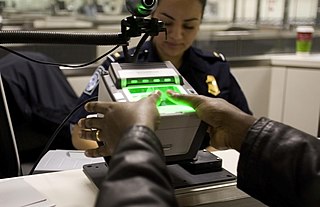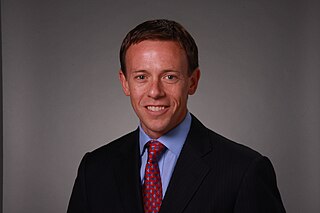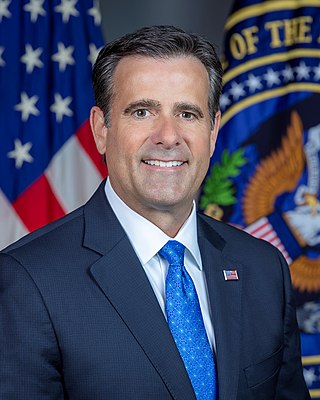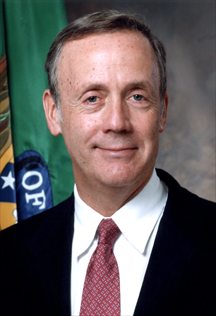Related Research Articles

The Immigration and Nationality Act of 1965, also known as the Hart–Celler Act and more recently as the 1965 Immigration Act, was a federal law passed by the 89th United States Congress and signed into law by President Lyndon B. Johnson. The law abolished the National Origins Formula, which had been the basis of U.S. immigration policy since the 1920s. The act formally removed de facto discrimination against Southern and Eastern Europeans as well as Asians, in addition to other non-Western and Northern European ethnicities from the immigration policy of the United States.

Tammy Suzanne Green Baldwin is an American politician and lawyer serving since 2013 as the junior United States senator from Wisconsin. A member of the Democratic Party, she has also served as the Secretary of the Senate Democratic Caucus since 2017 and is the dean of the United States congressional delegation from Wisconsin.

United States Visitor and Immigrant Status Indicator Technology is a U.S. Customs and Border Protection (CBP) management system. The system involves the collection and analysis of biometric data, which are checked against a database to track individuals deemed by the United States to be terrorists, criminals, and illegal immigrants. US-VISIT is accessed by 30,000 users from federal, state, and local government agencies. Upon Presidential approval of the 2013 Continuing resolution the US-VISIT program officially became the Office of Biometric Identity Management (OBIM), save for portions of the agency which performed overstay analysis being transferred into U.S. Immigration and Customs Enforcement and biometric Entry and Exit operations which became a part of U.S. Customs and Border Protection.

The Visa Waiver Program (VWP) is a program of the United States government that allows nationals of specific countries to travel to the United States for tourism, business, or while in transit for up to 90 days without having to obtain a visa. It applies to all fifty U.S. states, the District of Columbia, Puerto Rico, and the U.S. Virgin Islands, as well as to Guam and the Northern Mariana Islands, which also have an additional program with waivers for more nationalities; American Samoa has a similar but separate program.

The Diversity Immigrant Visa program, also known as the green card lottery, is a United States government lottery program for receiving an immigrant visa followed by a permanent resident card. The Immigration Act of 1990 established the current and permanent Diversity Visa (DV) program.

The Intelligence Reform and Terrorism Prevention Act of 2004 (IRTPA) is a 235-page Act of Congress, signed by President George W. Bush, that broadly affects United States federal terrorism laws. The act comprises several separate titles with varying subject issues. It was enacted in response to the terror attacks of September 11, 2001.
Reforming the immigration policy of the United States is a subject of political discourse and contention. Immigration has played an essential part in American history, as except for the Native Americans, everyone in the United States is descended from people who migrated to the United States. Some claim that the United States maintains the world's most liberal immigration policy.
The USA PATRIOT Act was passed by the United States Congress in 2001 as a response to the September 11, 2001 attacks. It has ten titles, each containing numerous sections. Title IV: Protecting the Border aims to prevent terrorism in the USA through immigration regulations. The provisions of the title generally increase the difficulty of entering the country for those known to have, or suspected of having, terrorist intent.
Passport fraud is an act of intentional deception that involves forgery, alteration, or false use of a travel document, such as a passport. Common reasons to perpetrate passport fraud include illegally entering a country, avoiding deportation, committing financial crimes, and smuggling.
During the 18th and most of the 19th centuries, the United States had limited regulation of immigration and naturalization at a national level. Under a mostly prevailing "open border" policy, immigration was generally welcomed, although citizenship was limited to “white persons” as of 1790, and naturalization subject to five year residency requirement as of 1802. Passports and visas were not required for entry into America, rules and procedures for arriving immigrants were determined by local ports of entry or state laws. Processes for naturalization were determined by local county courts.

Kathleen L. Casey is a former Republican commissioner of the U.S. Securities and Exchange Commission. She was appointed by President George W. Bush and sworn in on July 17, 2006. Her term expired in August 2011.
The Senate Judiciary Subcommittee on Immigration, Citizenship and Border Safety was one of six subcommittees within the Senate Judiciary Committee during the 114th Congress. The judiciary subcommittee on immigration is called the Subcommittee on Border Security and Immigration for the 116th Congress and was called Immigration, Refugees, and Border Security during the 113th Congress.

Matthew Glen Olsen is an American attorney who had served as the Assistant Attorney General for the National Security Division. He is the former director of the National Counterterrorism Center.

Joseph W. Jacquot is the general counsel to the governor of the State of Florida. Previously Jacquot was the chief deputy attorney general of the State of Florida from 2007 to 2011. He successfully argued before the United States Supreme Court in the landmark Miranda warning case Florida v. Powell and initiated the constitutional lawsuit against the Affordable Care Act ("Obamacare").
Mary A. Ryan (1940–2006) was a United States career diplomat who served as United States Ambassador to Swaziland from 1988 to 1990 and as Assistant Secretary of State for Consular Affairs from 1993 to 2002. Ryan also served overseas in Italy, Honduras, Mexico, Côte d'Ivoire, and Sudan.

John Lee Ratcliffe is an American politician and attorney who has served as the ninth director of the Central Intelligence Agency (CIA) since 2025. He previously served as the sixth director of national intelligence from 2020 to 2021 and served in the United States House of Representatives from 2015 to 2020.

David Aufhauser is an American lawyer. He served as general counsel of the United States Treasury Department from 2001 to 2004 during the George W. Bush administration. After 9/11, Aufhauser was a key player in disrupting and freezing further terrorist activity against the U.S. He is best known for running the federal government's programs to go after terrorist financing, a major strategy in the war on terror. He ran the National Security Council Committee on Terrorist Financing; oversaw the legal departments of important agencies and divisions within the U.S. Treasury Department including International Banking, Domestic Banking, the U.S. Customs Service, IRS criminal and civil divisions, ATF, Financial Crimes and Money Laundering, and United States Secret Service; and supervised the federal government's multi-agency antiterrorism task force. In his numerous briefings before the House and Senate, he emphasized the importance of teaching tolerance and respect, often making clear distinctions between the vast majority of peaceful people in the Middle East and the practitioners of “counterfeit religion” who preyed on hopelessness to recruit terrorists.

Executive Order 13769, titled Protecting the Nation from Foreign Terrorist Entry into the United States, labeled the "Muslim ban" by Donald Trump and his supporters and critics alike, and commonly known as such, or commonly referred to as the Muslim travel ban, Trump travel ban, the Trump Muslim travel ban, or the Trump Muslim Immigration Ban, was an executive order by President Trump. Except for the extent to which it was blocked by various courts, it was in effect from January 27, 2017, until March 6, 2017, when it was superseded by Executive Order 13780, a second order sharing the title "Protecting the Nation from Foreign Terrorist Entry into the United States".

Kevin Kealoha McAleenan is an American attorney and government official who served as the acting United States secretary of homeland security from April to November 2019.

Deborah Mucarsel-Powell is an American politician and academic administrator who served as the U.S. representative for Florida's 26th congressional district from 2019 to 2021. A member of the Democratic Party, she represented a district in the southern Miami-Dade County, including Homestead and the Florida Keys.
References
- ↑ Nixon, Ron (2016-01-01). "U.S. Doesn't Know How Many Foreign Visitors Overstay Visas". The New York Times. ISSN 0362-4331 . Retrieved 2024-08-28.
- ↑ "Feds: Calif. man ran student visa fraud ring". NBC News. 2010-03-09. Retrieved 2024-08-28.
- ↑ Fleischer, Jodie; Reporter, News4 I.-Team; Yarborough, Rick; Jones • •, Steve (2018-02-14). "Americans Say Immigrants Duped Them Into Marriage, Then Claimed Abuse to Stay in US". NBC4 Washington. Retrieved 2024-08-28.
{{cite web}}: CS1 maint: numeric names: authors list (link) - ↑ "New driver license legislation proposed". SecureIDNews. Retrieved 2024-08-28.
- ↑ "Post-9/11 reforms don't stop passport fakery". NBC News. 2009-03-14. Retrieved 2024-08-28.
- ↑ "The challenges of airport entry and exit in the U.S." SecureIDNews. Retrieved 2024-08-28.
- ↑ Chayka, Kyle (2014-04-17). "Somebody's Watching". Newsweek. Retrieved 2024-08-28.
- ↑ "The terror-immigration connection". NBC News. 2005-07-03. Retrieved 2024-08-28.
- ↑ "Personal Identification Documentation | C-SPAN.org". www.c-span.org. Retrieved 2024-11-04.
- ↑ "Immigration Policy, Enforcement | C-SPAN.org". www.c-span.org. Retrieved 2024-11-04.
- ↑ "Border Security and False Identification | C-SPAN.org". www.c-span.org. Retrieved 2024-11-04.
- ↑ "Terrorism and the Visa Waiver Program - Part 1 | C-SPAN.org". www.c-span.org. Retrieved 2024-11-04.
- ↑ "Janice Kephart, Department of Homeland Security (DHS)".